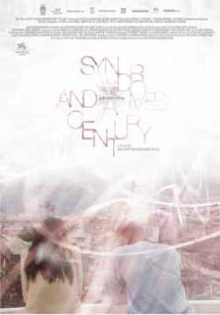
This is another film by Thailand’s most celebrated filmmaker Apichatpong Weerasethakul thought it predates the other two we’ve already watched. It consists of two distinct halves, one seemingly set in the past in rural Thailand and the other in the present in Bangkok. Some characters and situations recur but there doesn’t otherwise seem to be any connection. Unfortunately while I liked the cinematography and the atmosphere, I couldn’t really make head or tails of what the director was trying to do here.
Both sets of scenes are set amidst hospitals. A woman doctor interviews an incoming new doctor who seems amiable enough but reaches for a ridiculous answer when asked what DDT stands for. An aged monk tells a doctor how pains in his joints and he believes he is being punished for being cruel to chickens in his youth. A dentist who also moonlights as a singer befriends one of the other monks who is accompanying the older monk. In the past, an embarrassed guard tries to woo the woman doctor but she only seems amused and recounts a story of her own about another man. In the present, we see the new doctor getting to know some of his new colleagues and an encounter between him and his girlfriend at his workplace.
The entire film consists of disconnected scenes like the above, each telling a self-contained little story with often no clear resolution to any of them. Even trying to decipher some common theme or thread that runs through proves tough, beyond the director’s usual observation that the mysterious and mystical live side by side with the mundane in Thailand. Reading up on the director’s intentions from his interviews doesn’t help much either. He claims that it was originally meant to be an autobiographical film about his parents who were both doctors in the rural northeast of Thailand but he allowed it to sprawl organically as he worked on it. In the end, I’m not sure that it’s supposed to have any sort of a coherent narrative even in a director’s own mind apart from some vague notions of time passing and people changing.
Frustrating as the experience of watching it can be, it remains remarkable how the director can evoke such a powerful sense of place with so little to work with. The dialogue that casually alludes to reincarnation and prophetic dreams instantly makes even the most humdrum conversations fascinating. The camera work is also deceptively good. In the first half for example of the shots of the interior of what looks like a run-down hospital look boring. But then the camera pans out of the window to look at the fields of brilliant green outside and you get a sense of how this hospital must be a bastion of the Thai state in the middle of the countryside. Then when it switches to modern Bangkok with the aggressively white hospital halls and modern medical technology, it’s like it’s saying that yes, the countryside is Thailand but the city is Thailand too. After watching the work of Chinese director Bi Gan, I’ve begun to appreciate better how Apichatpong is similarly fueled by his love of his homeland and especially the Isan region.
Still it’s very hard to like a film of which you can understand so little so I can’t really recommend this. I’m afraid that if the director keeps making films like this, he will test even my patience. It would be great if he could make something a little more conventional and approachable.